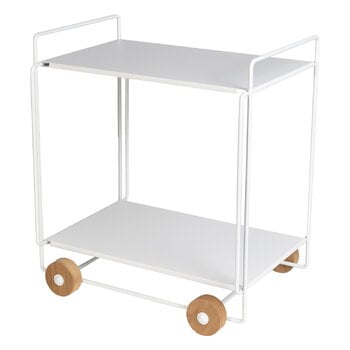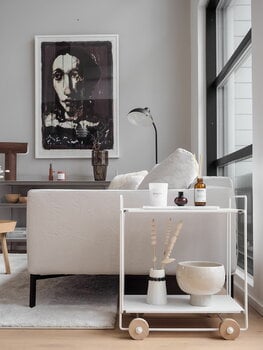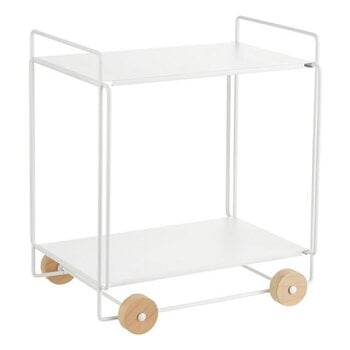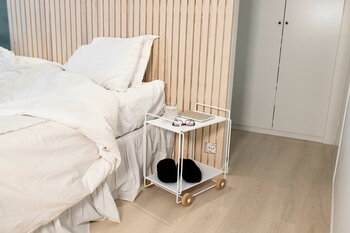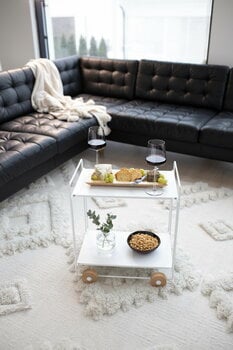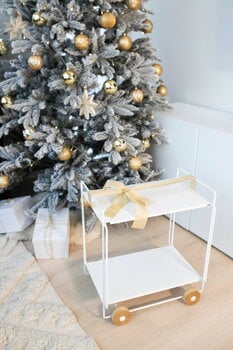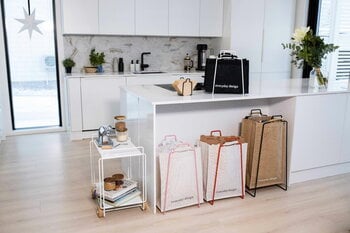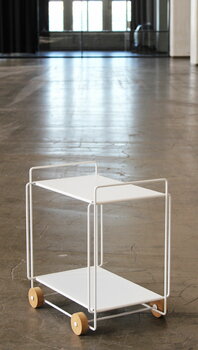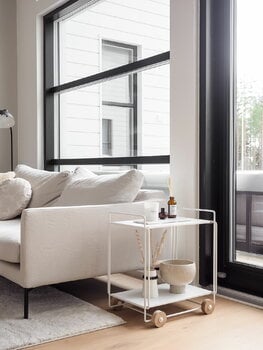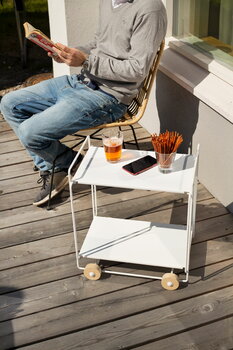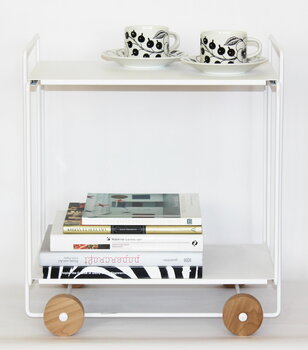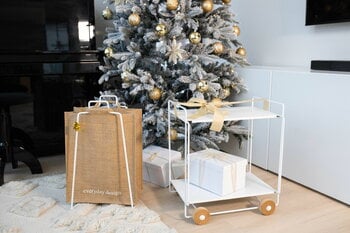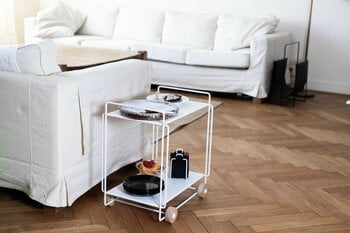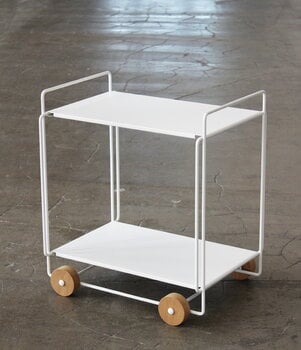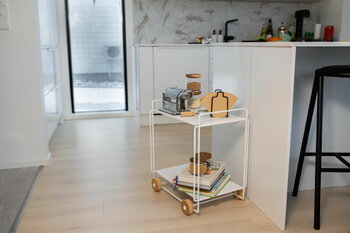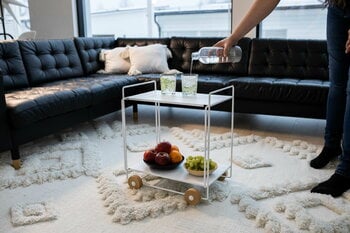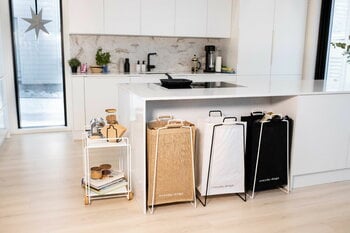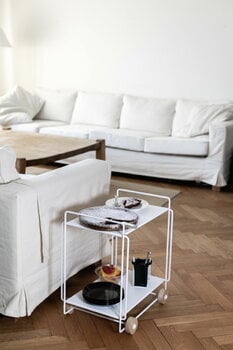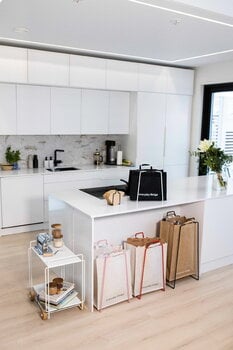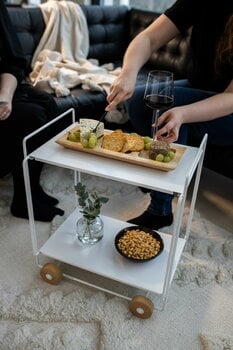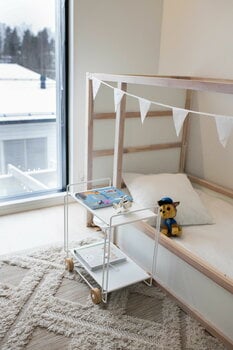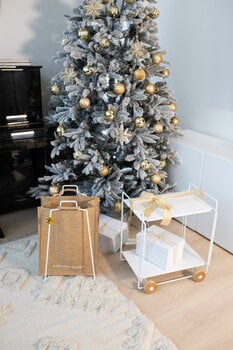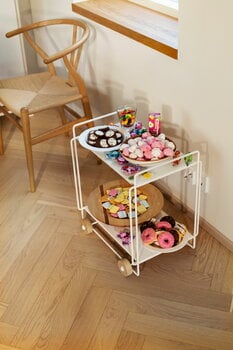Everyday Design’s Tampere serving trolley is a handy, practical and cleverly sized helper to add more space to even the smallest spaces. The serving trolley is made of durable metal and features wheels made of aspen, with a natural look that brings soft warmth to the industrial appearance of the trolley. The multipurpose Tampere trolley can be used as a serving trolley for dinners, as an additional side table in the kitchen or as a shoe and accessory trolley in the hallway – the possibilities are almost endless! Designed by Helena Mattila, the serving trolley is manufactured in Finland and named after the Finnish town Tampere, which is the most populous inland city in the Nordics.
Tampere serving trolley, white
Everyday Design
Description
Everyday Design’s Tampere serving trolley is a handy, practical and cleverly sized helper to add more space to even the smallest spaces. The serving trolley is made of durable metal and features wheels made of aspen, with a natural look that brings soft warmth to the industrial appearance of the trolley. The multipurpose Tampere trolley can be used as a serving trolley for dinners, as an additional side table in the kitchen or as a shoe and accessory trolley in the hallway – the possibilities are almost endless! Designed by Helena Mattila, the serving trolley is manufactured in Finland and named after the Finnish town Tampere, which is the most populous inland city in the Nordics.
Product details (8)
- Colour
- White
- Width
- 48 cm
- Depth
- 36 cm
- Height
- 54 cm
- Height between shelves
- 36.7 cm
- Material
- Metal (30% recycled), aspen
- Weight
- 6 kg
- Notes
- Delivered assembled.
- Product ID
Designer
Helena Mattila is a Finnish industrial designer who has worked as CEO and head designer of the Finnish design brand Everyday Design since 1995. Mattila’s smart and timeless designs have been awarded with several international design awards, and they have been seen at New York’s MoMA’s and Design Museum London’s design stores. Besides a designer, Mattila is also an artist who inspires from nature and ecological thinking.
View all productsReviews (3)
4.67
Based on 3 reviews
-
A
Anonymous
Belgium
310 days ago
-
A
anonyymi
Lahti, Finland
Kaunis ja käytännöllinen.
381 days ago
-
A
anonyymi
Lahti, Finland
Sopi erinomaisesti käyttötarkoitukseeni.
49 days ago
Sustainability
The Product Sustainability Framework, our criteria of sustainable design, helps you find the most sustainable products in our selection. Read below which sustainability criteria this product has met.
Working conditions & labour 9/9
-
Equal opportunities for all employees
-
Commitment to UN Global Compact, fair compensation for all employees
-
Corporate responsibility requirements defined and communicated for suppliers
-
Systematic work for improved inclusion and well-being in the workplace
-
Transparent supply chain
-
Suppliers' compliance to a code of conduct ensured
-
Direct suppliers audited and certified
-
Compliance to the UN Guiding Principles on Business and Human Rights ensured in the supply chain
-
Support for community involvement in the supply chain
Eco-friendly production 8/9
-
Fair and resource-wise water-use in production
-
No incineration or landfilling of returned items
-
No use of endangered species as materials
-
No direct environmental emissions or waste (excl. GHGs) from production
-
The sustainability of direct suppliers' production is addressed and monitored
-
Production and material sourcing that respect biodiversity, animal rights, and natural ecosystems
-
Material-efficient and ecological packaging
-
No potentially harmful chemicals used in own production
-
Positive impact on nature’s well-being through operations that regenerate natural ecosystems
Climate impact 4/8
-
Company's direct greenhouse gas emissions identified and commitment to reduction
-
Product's carbon impact identified and commitment to reduction
-
Guidance on energy- and eco-efficient use of the product
-
Contribution to climate initiatives beyond the brand’s direct operations
-
Low-carbon or compensated transportation
-
Carbon footprint of the product calculated and goals set to reduce it
-
100 % renewable energy in own production and operations
-
Carbon neutral or carbon negative product
Sustainable materials 5/6
-
Sustainable and long-lasting material choices
-
No harmful or hazardous substances
-
Responsible raw material sourcing and production
-
Materials suited for circularity: monomaterials, recyclable finishings, renewable or recycled contents etc.
-
Ecological materials: natural, biodegradable, recyclable or recycled contents
-
Outstanding materials in terms of innovativeness, responsibility, sustainability and circularity: local production or sourcing, 100 % recycled content, C2C-certification etc.
Circular design 5/5
-
High aesthetic quality promoting long-term use of the product
-
Technically durable product design and material choices
-
Design for enduring life-long quality
-
Design and support for product maintenance, repair and upgradability
-
Innovative circular design solutions: circular service system, resale platform, remanufacturing, collection of used products, etc.
